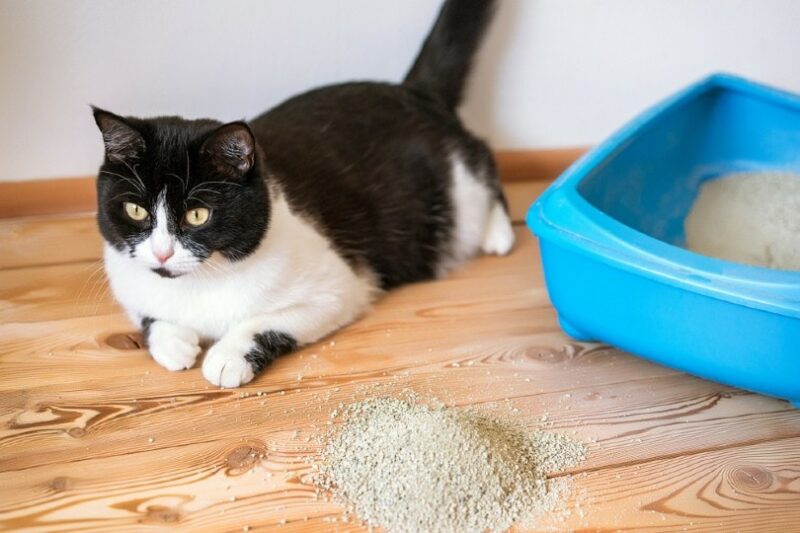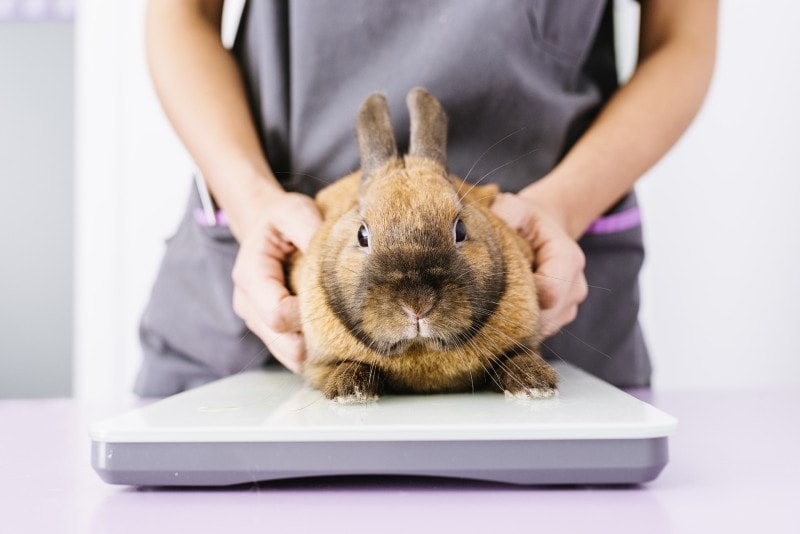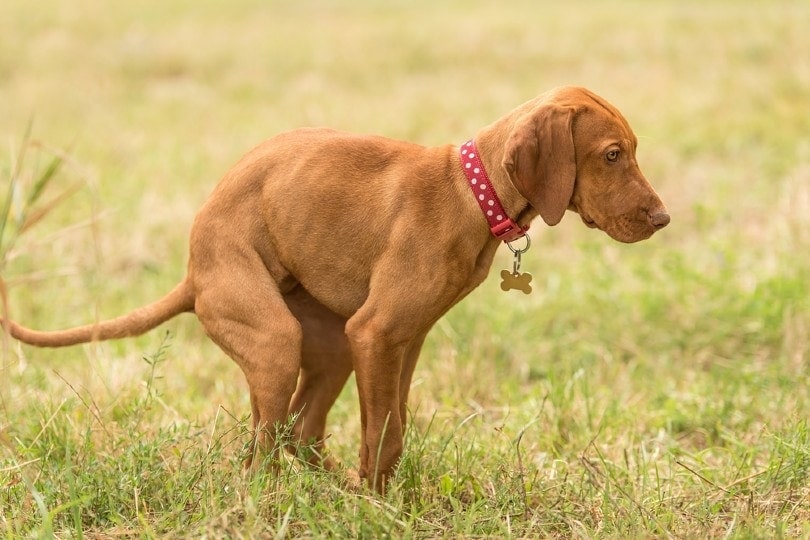VET APPROVED

The information is current and up-to-date in accordance with the latest veterinarian research.
Learn more »Cats sometimes show eating habits that may seem strange. You might have even noticed your feline eating their own poop (feces). This behavior is known as coprophagia, and it can occur in both cats and dogs1. You may be wondering why this happens, how to help your feline, and how to stop them from engaging in this activity.
Cats may eat their own feces simply due to curiosity, grooming, cleanliness, or due to a health or behavioral issue. You should know how to determine the cause of your pet’s poop eating so you can figure out what can be done for them.
Read on as we discuss this behavior throughout this article and provide more information about it.

Is It Normal for Cats to Eat Their Poop?
When it comes to cats, eating their poop can be normal and instinctual in certain stages of life. Mother cats will lick their newborn kittens’ anogenital area to stimulate toileting, and they will consume the kittens’ waste. Additionally, kittens may develop this habit when they notice their mother licking and grooming, or it can happen as an instinct to ensure proper gastrointestinal tract development.
Also, cats love to be clean and groom themselves often, so if your feline has accidentally defecated on themselves, they will simply lick the area to be cleaner. Although this particular behavior is disgusting to most humans, it doesn’t mean that your cat has a health problem. When coprophagia becomes a habit, it should not be ignored.
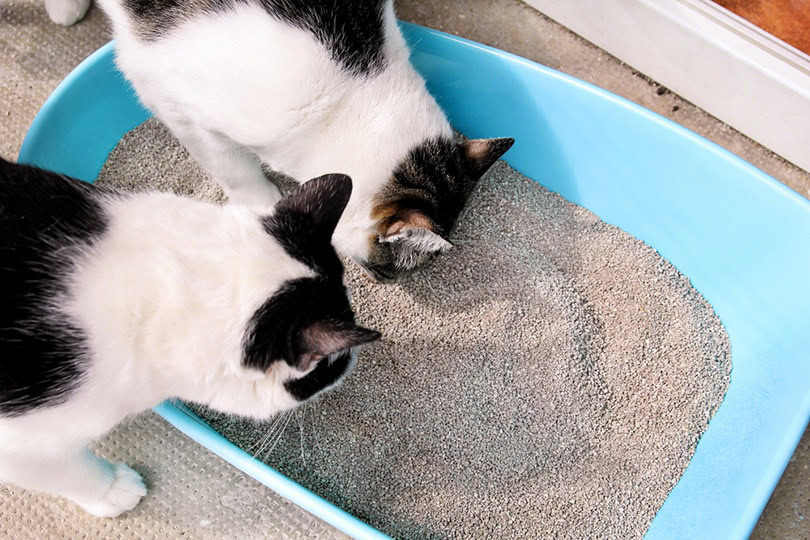

The Reason Behind This Strange Habit
Coprophagia is not very common in cats, but it may happen. There can be a few reasons that your cat is eating their poop, and these can be both medical and behavioral. Here we will go through the clues that will help you figure out what’s going on.
Medical Reasons
First, let’s go over some medical reasons that your cat may eat their poop.
- Nutritional deficiency. If your feline’s diet or digestive system is not right, the kitty might be lacking some nutrients that, along with signs like weight loss, diarrhea, weakness, or poor coat, will manifest as poop eating.
- Parasites. Another possible reason behind poop eating in cats is intestinal parasites. If your cat suffers from a parasite infestation, you might be able to see worms, worm segments, or, most commonly, nothing at all! To accurately diagnose intestinal parasites, your vet will have to do a fecal examination, but sometimes they may opt for deworming your cat and see if the problem resolves.
- Diseases causing extreme hunger. Conditions such as diabetes, hyperthyroidism, and intestinal cancer can severely affect your cat’s appetite, and they may eat their feces due to hunger, even if they have access to proper cat food.
Behavioral Reasons
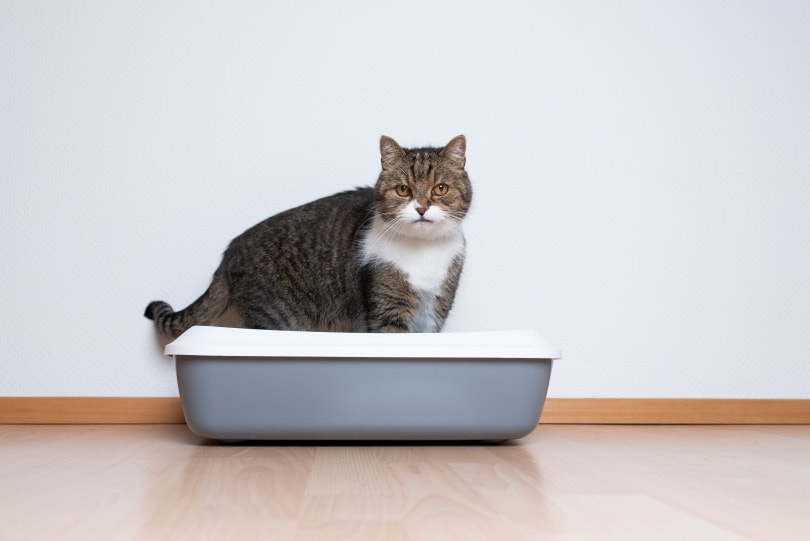
Behavioral reasons can also be a cause for coprophagia. Cats may eat their own feces to clean their environment or to attract attention. Felines might also eat their feces due to stress and anxiety, and some cats may even eat their poop as a response to punishment from their owners.
How to Make a Diagnosis
If you notice this issue, it’s best to schedule a vet checkup. Your veterinarian will be able to determine if the feces-eating pattern has a medical or behavioral cause. They will likely do a complete full examination and run some tests such as blood work, fecal examination, and a urinalysis to check if there’s any abnormality in your cat’s organ function and health. If the reason for poop eating in your cat is not medical, your vet will need to know everything about your feline’s eating habits, history, and environment.
Do not play doctor yourself, and do not deny the problem, as it can lead to severe consequences.

Does Eating Poop Cause Sickness to Felines?
Although coprophagia is usually not a problem if done as a one-off event, your cat can still suffer from various problems if they develop this habit. When ingesting poop, cats can perpetuate their own parasitic infection, or catch parasites if they eat other cats’ poop. These diseases can also harm you, so be cautious.
If you notice your cat doing this, do not allow them to lick you, and ensure that you wash your hands regularly until you resolve the problem with your feline.
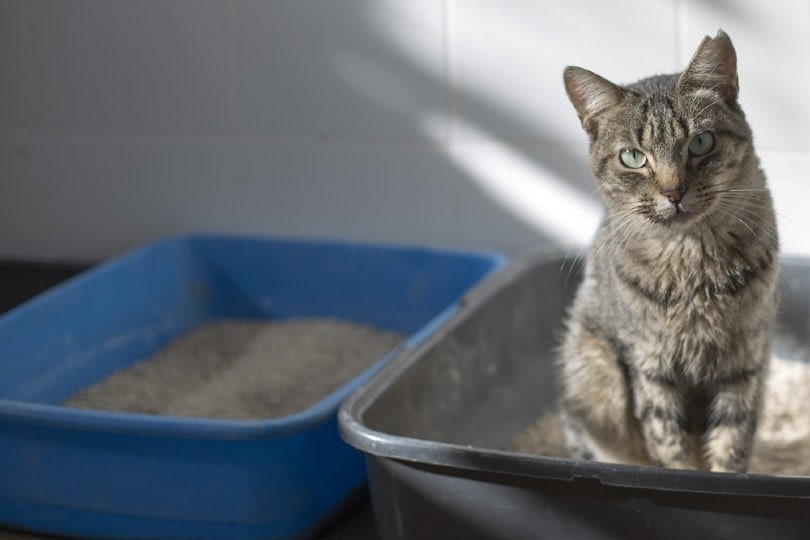

The 3 Ways to Prevent Your Cat From Eating Their Poop
Poop eating in felines is a habit that might be difficult to break, so be prepared and patient with your kitty. There are a few things you can do to prevent your cat from eating their poop.
- See Also: Why Won’t My Kitten Poop?
1. Clean Up After Your Cat
The best way to prevent your cat from eating their feces is to pick it up or dispose of it when you notice your feline pooping. Constant cleaning after your cat defecates might be daunting since you’ll need to be extra careful, but it will help with the issue. You could even buy an automatic litter box that immediately scoops off feces once your cat goes. If you’re taking your feline outside, it might be useful to have a leash or a harness so you can pull them away if they try to eat their poop.
Even if you keep a clean and tidy litterbox, you probably still find yourself with cat odors and stains around the house – but with the Hepper Advanced Bio-Enzyme Pet Stain & Odor Eliminator Spray, you can permanently remove even the very worst pet stains and smells! Click here to learn more and get yourself a bottle.
- ADVANCED ENZYMATIC CLEANER - Penetrates the most stubborn smells and stains at the deepest molecular...
- FOR ANY MESS, ON ANY SURFACE - This pet odor eliminator cleans your carpets, floors, furniture,...
- FRESH, NATURAL ODOR - Our unique formulation doesn't rely on dangerous or unpleasant chemical...
At PangoVet, we’ve admired Hepper for many years, and decided to take a controlling ownership interest so that we could benefit from the outstanding products of this cool cat company!
2. Provide Environmental Enrichment
Since cats can sometimes eat their poop as a sign of boredom or anxiety, you can look at your living space and consider ways to enrich your cat’s environment to fulfill their instincts and keep them stimulated. Provide opportunities for interactive feeding, scratching, playing, retreating, and being adventurous. Try to engage your cat in family activities and give them love and care. Physical and mental stimulation is important to prevent unwanted behaviors and ensure your cat’s happiness.
- See Also: Best Cat Exercise Wheels
3. Do Not Punish Your Cat
If you notice that your cat is eating their poop, do not punish or scold them. Such a reaction from your side can make your feline even more anxious or scared, so they might continue to eat feces to avoid a negative reaction. Ensure that you reward your cat when they don’t eat poop in the situations when they previously did. Your positive attitude toward the problem will help your cat and encourage them to stop this habit.
- See Also: How to Make a Kitten Poop?

Conclusion
Coprophagia or poop eating is a habit that can be hard for your cat to break, but you shouldn’t be discouraged. Try to catch the problem early and do not ignore it. Always consult your vet to ensure that the issue is not medical, and in case it is, you should provide the required treatment and medication.
Remember that your cat needs someone to rely on when times are tough, as this situation can be complicated. Your kitty will appreciate you taking all the required steps to help them fight this habit and develop a healthy diet and ensure their well being.
- See Also: Signs That Your Cat May Be Sick
Featured Image Credit: Tanya Plotnikova, Shutterstock
